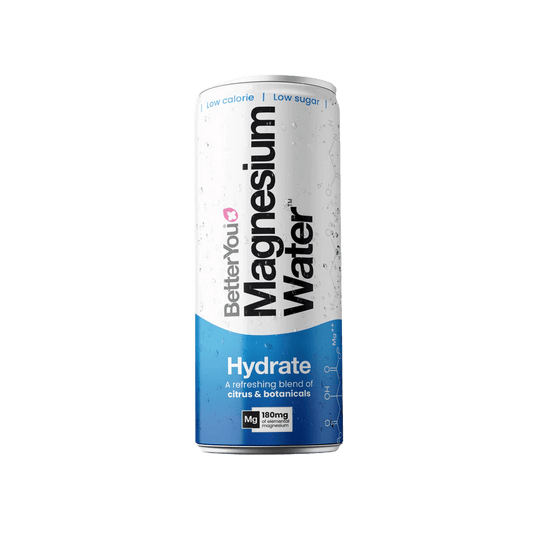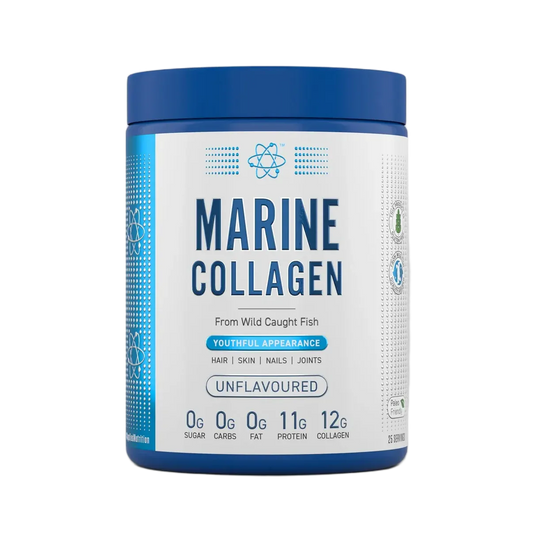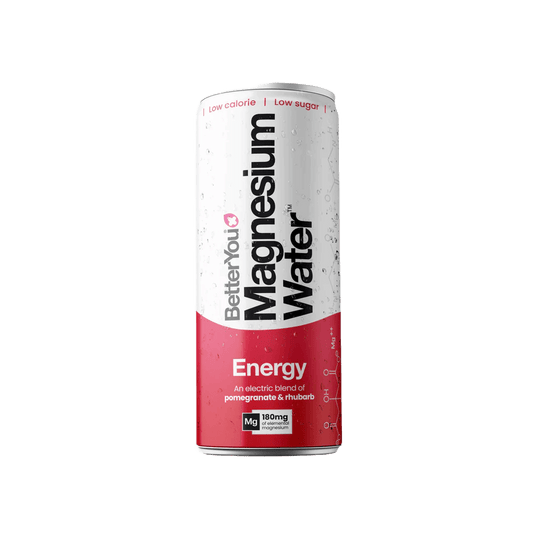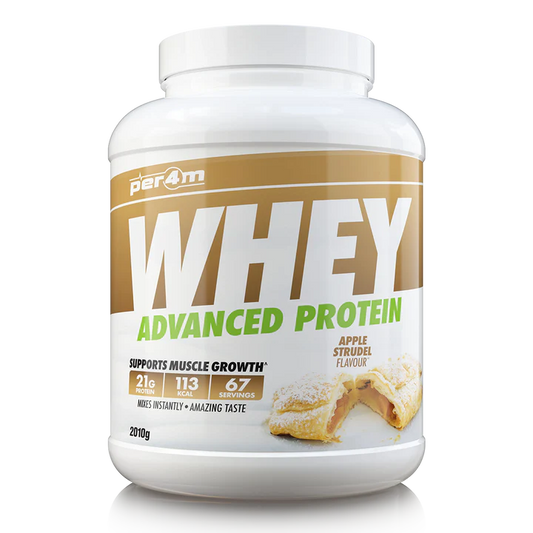When you picture collagen, you might think of glossy skin adverts or influencer reels promising youthful glow. But in the world of serious training, collagen has quietly earned respect for something far more practical — joint health, tendon resilience, and post-workout recovery. And when it comes to the question “Is Applied Nutrition Collagen actually good?” the short answer is yes — but the reasons why go far beyond vanity metrics or brand hype.
1. Why Collagen Matters More Than You Think
Collagen makes up around 30 percent of all the protein in your body. It’s the scaffolding that keeps muscles attached, ligaments flexible, and joints stable.
Unlike whey or creatine, collagen doesn’t directly build new muscle tissue — instead, it keeps the foundation strong enough to handle heavy lifts, long runs, and intense cardio sessions. For anyone who trains consistently, that means fewer aches, faster recovery, and more longevity in the gym.
Applied Nutrition’s range — both Collagen Peptides and the newer Marine Collagen — targets this side of performance rather than pure bulking. Think of it as recovery insurance that complements, rather than competes with, products like Naughty Boy Prime Creatine or Per4m Advanced Whey.

2. What Makes Applied Nutrition Collagen Different
Applied Nutrition’s approach stands out because of its clinical-grade peptide quality and transparency.
Each serving of Collagen Peptides delivers 20 g of hydrolysed collagen — meaning the amino acids are already broken down into smaller, easier-to-absorb chains. That’s crucial because collagen’s biggest flaw in older formulas was poor digestion. Hydrolysis fixes that.
Their Marine Collagen offers an even finer peptide size, derived from wild-caught fish sources — making it naturally richer in glycine and proline, the two amino acids most linked to skin elasticity and connective tissue repair.
Both versions are:
-
Non-GMO
-
Dairy-free
-
Keto-friendly
-
And contain added vitamin C (which helps trigger your body’s own collagen synthesis).
Paired with recovery staples like Supplement Needs Omega 3 or BetterYou Magnesium Water, the result is a complete support stack for joints, skin, and muscle recovery that fits seamlessly into any training routine.
3. Collagen Peptides vs Marine Collagen: Which Should You Choose?
-
Collagen Peptides: The best choice for lifters, runners, and anyone rehabbing an injury. It supports tendon and ligament strength — particularly valuable during high-volume training or cutting phases when connective tissues are under stress.
-
Marine Collagen: Favoured for beauty-plus-performance goals — improved skin hydration, reduced joint stiffness, and better tissue elasticity. It’s ideal for athletes who also care about visible skin health.
In short, Peptides = Power, Marine = Repair & Renew. Many people rotate both — one scoop of Peptides in a Per4m Advanced Whey shake post-training, and Marine Collagen in a morning smoothie for sustained results.

4. Is Applied Nutrition High Quality?
Yes — and it shows in the certifications.
Applied Nutrition products are made in a GMP-certified facility, batch-tested for banned substances, and widely used by professional athletes. The powder mixes cleanly (no chalky residue), and the unflavoured option blends effortlessly with protein, greens, or coffee — something few brands get right.
The brand’s consistency is also its biggest strength. Where other collagens hide behind vague “beauty” claims, Applied Nutrition focuses on tangible recovery benefits — faster tissue repair, less post-workout joint pain, and stronger nails and hair over time.
Pairing Collagen Peptides with Naughty Boy Prime Creatine makes sense scientifically: collagen helps tendons handle heavier loads, while creatine powers the muscle contraction itself.

5. What Happens When You Start Taking Collagen
The effects aren’t overnight, but they are measurable:
-
2–3 weeks: Slight improvements in skin hydration and general recovery.
-
4–6 weeks: Noticeable reduction in joint discomfort during heavy sessions.
-
8–12 weeks: Stronger nails, improved hair texture, and lasting skin elasticity.
Consistency matters. Collagen works best when taken daily — ideally with a source of vitamin C to trigger synthesis. For many athletes, that means mixing a scoop into BetterYou Magnesium Water or pairing it with breakfast to start recovery from the inside out.
✅ Recap of Part 1
So far, we’ve covered:
-
The real reason collagen matters beyond aesthetics.
-
What makes Applied Nutrition Collagen Peptides and Marine Collagen unique.
-
How hydrolysed peptides speed up absorption.
-
Which collagen is right for muscle vs skin recovery.
- Why daily use is the key to long-term benefits.
🔜 Coming in Part 2
We’ll dive into:
-
The science behind collagen synthesis and amino-acid balance.
-
How collagen stacks with creatine and whey for full recovery.
-
The myths about collagen “not working.”
-
Real-world feedback and results timeline.
-
When (and how) to take collagen for maximum effect.
Is Applied Nutrition Collagen Good? (Part 2)
If Part 1 explored what makes Applied Nutrition Collagen different, Part 2 unpacks why it works. The goal here isn’t to oversell — it’s to clarify the real, biological reasons collagen can improve recovery, mobility, and performance, especially when combined with smart nutrition.
6. The Science Behind Collagen Synthesis
Your body’s natural collagen production begins to decline in your mid-20s, dropping by roughly 1 percent each year. Combine that with hard training, caloric deficits, and stress, and you’ve got the perfect storm for slower recovery and nagging joint issues.
Applied Nutrition’s formula targets this decline head-on with hydrolysed peptides — smaller amino chains that are rapidly absorbed and delivered to connective tissue. Once in the bloodstream, they act as signals to fibroblast cells, stimulating new collagen production.
In short: hydrolysed collagen doesn’t just “replace” lost protein — it tells your body to make more of its own.

7. Collagen + Creatine: The Performance Duo
Collagen strengthens the scaffolding; creatine powers the engine.
Stacking Applied Nutrition Collagen Peptides with Naughty Boy Prime Creatine offers one of the most balanced recovery pairings in sports nutrition.
-
Creatine replenishes ATP, helping muscles push through heavy sets.
-
Collagen reinforces the tendons and ligaments bearing that load.
This combo means fewer strains, better lift efficiency, and a reduced risk of overuse injuries. It’s why many athletes take collagen in the morning for connective tissue support, then creatine around training to fuel output.
8. Marine Collagen vs Peptides: Skin, Joints, and Recovery
Applied Nutrition’s Marine Collagen differs from standard Peptides in both source and texture.
Derived from wild-caught fish, its peptide profile contains more glycine, proline, and hydroxyproline — three amino acids crucial for joint lubrication and skin elasticity.
Collagen Peptides, on the other hand, provide broader connective-tissue support and slightly higher overall protein yield.
-
Marine Collagen: smoother skin, joint flexibility, tendon comfort.
-
Collagen Peptides: muscle recovery, ligament repair, and stronger bones.
Many users find that alternating the two — Marine in the morning, Peptides post-workout — offers full-spectrum results without digestive heaviness.
9. Common Myths About Collagen
Myth 1: “It’s just hype — collagen can’t rebuild joints.”
Fact: Clinical studies (such as Clark et al., 2008) show hydrolysed collagen increases cartilage density and reduces exercise-related joint pain.
Myth 2: “You can get all the same benefits from whey.”
Not quite. Whey is rich in leucine for muscle protein synthesis, but collagen provides glycine and hydroxyproline, which whey lacks — both critical for tendon repair.
Myth 3: “It’s only for women.”
Wrong. Collagen is a joint-protection supplement, not a beauty product. It’s as beneficial for powerlifters as it is for anyone seeking better skin.

10. Real-World Results and Timing Tips
Athletes who take Applied Nutrition Collagen daily typically report:
-
After 3 weeks: subtle reduction in joint creaks and stiffness.
-
After 6 weeks: faster recovery from heavy leg or shoulder sessions.
-
After 12 weeks: visibly improved skin tone and smoother hair texture.
How to take it:
-
1 scoop (20 g) of Collagen Peptides with water or your Per4m Advanced Whey shake post-training.
-
1 scoop of Marine Collagen in morning coffee, juice, or BetterYou Magnesium Water.
-
Pair with Supplement Needs Omega 3 daily for inflammation control.
Consistency beats timing — collagen’s benefits build with repetition, not intensity.
11. Who Should Use Collagen (and Who Shouldn’t)
Collagen is ideal for:
-
Strength athletes or runners with joint wear.
-
Anyone cutting calories but wanting to preserve recovery capacity.
-
Lifters returning from injury.
-
Those seeking long-term skin and joint health.
Avoid if:
-
You have fish allergies (for Marine Collagen).
-
You expect instant results — collagen is a marathon, not a sprint.
-
You’re already consuming high levels of bone-broth or gelatin protein.
12. Beyond the Gym: The Longevity Angle
Collagen isn’t just a recovery aid — it’s a longevity nutrient. Adequate collagen levels improve posture, spinal health, and even cardiovascular elasticity. Combined with magnesium and omega 3, it becomes part of a holistic recovery ritual — sleep deeper, train harder, recover faster.
A daily “longevity stack” might look like:
-
Morning: Marine Collagen + BetterYou Magnesium Water
-
Post-Workout: Collagen Peptides + Per4m Advanced Whey
-
Evening: Naughty Boy Prime Creatine + Supplement Needs Omega 3
Conclusion: The Verdict on Applied Nutrition Collagen
Applied Nutrition didn’t reinvent collagen — they refined it. With lab-verified quality, clean formulation, and a visible results timeline, their Collagen Peptides and Marine Collagen deliver real structural and cosmetic benefits.
They’re not miracle powders; they’re reliable recovery tools. Whether you’re lifting heavy, running long, or simply aging smart, this collagen duo fits seamlessly into any evidence-based supplement plan.
FAQ — Is Applied Nutrition Collagen Good?
1. Does Applied Nutrition Collagen actually work?
Yes — hydrolysed (pre-digested) collagen peptides are absorbed efficiently and can support joint comfort, tendon resilience, and skin elasticity when taken daily over several weeks.
2. How long does it take to see results?
Typical timelines: around 3 weeks for subtle joint comfort or skin hydration, 6–8 weeks for noticeable recovery benefits, and 8–12 weeks for visible skin, hair, and nail changes. Consistency matters more than timing.
3. Collagen Peptides vs Marine Collagen — which should I choose?
-
Collagen Peptides (bovine): Broader connective-tissue support for lifters and runners, ideal post-workout.
- Marine Collagen (fish): Finer peptides often favoured for skin hydration, elasticity, and joint comfort, easy to take in morning drinks.
Many users rotate both — Marine in the morning, Peptides after training.
4. Is Applied Nutrition Collagen high quality?
Yes. It’s hydrolysed for superior absorption, produced in GMP-certified facilities, and formulated with vitamin C to support collagen synthesis. It mixes smoothly and stacks well with other recovery supplements.
5. Does the NHS recommend collagen?
No — the NHS doesn’t make formal supplement recommendations. However, multiple studies suggest hydrolysed collagen can support joint and skin health in active adults. It’s best viewed as a recovery supplement, not a medical treatment.
6. Is collagen safe to take every day?
For most healthy adults, yes. Collagen is a natural protein with an excellent safety profile. Those with fish allergies should avoid Marine Collagen and opt for Peptides instead.
7. Can I take collagen with whey and creatine?
Absolutely. They complement each other:
-
Whey: Builds muscle.
-
Creatine: Boosts power and strength.
- Collagen: Strengthens tendons, ligaments, and skin.
Stacking them offers complete recovery and performance support.
8. What’s the best time to take collagen?
The best time is the time you’ll remember daily.
-
Morning: Marine Collagen in coffee or juice.
-
Post-workout: Collagen Peptides mixed with your whey shake.
Include a source of vitamin C to enhance absorption.
9. What are the first signs collagen is working?
Expect smoother skin, stronger nails, less joint stiffness, and greater training resilience. Over time, you may notice easier recovery and reduced post-session soreness.
10. Will collagen help muscle growth like whey?
Not directly — collagen isn’t rich in leucine, so it’s not a primary muscle-building protein. Instead, it supports connective tissues that make harder training possible without injury.
11. Are there side effects?
Rarely. Some people experience mild bloating or digestive discomfort when starting collagen; this usually fades with regular use or smaller servings. Always check ingredient labels for allergens.
12. Is Marine Collagen pescatarian-friendly?
Yes. It’s sourced from wild-caught fish, making it suitable for pescatarians who avoid bovine or porcine collagen sources.





